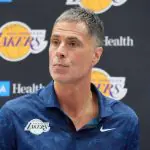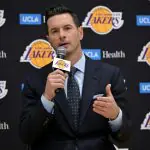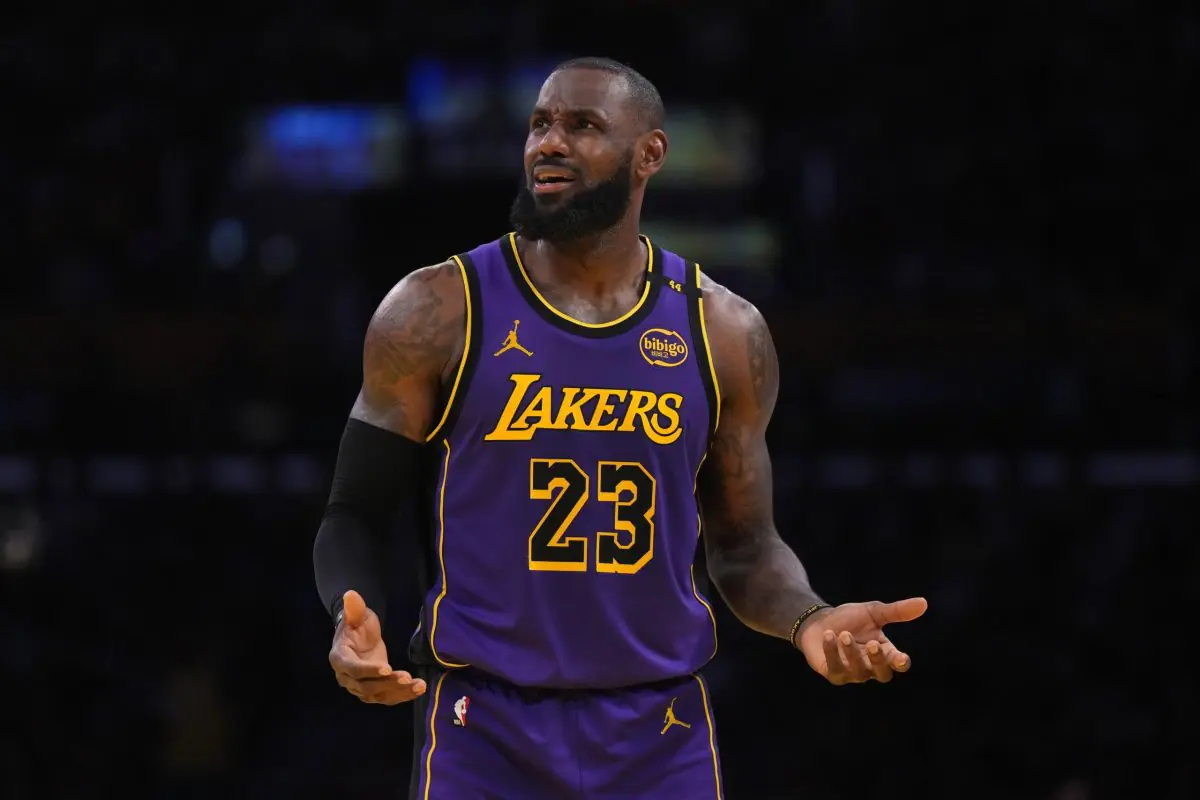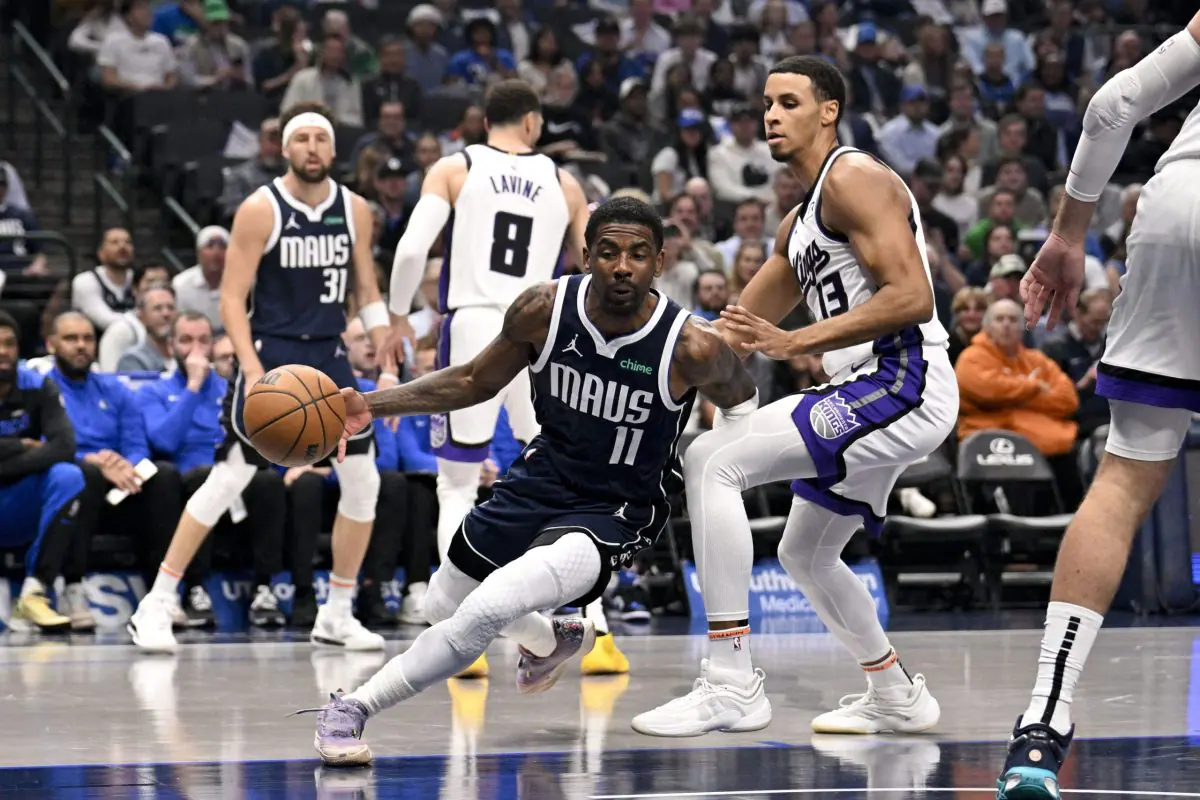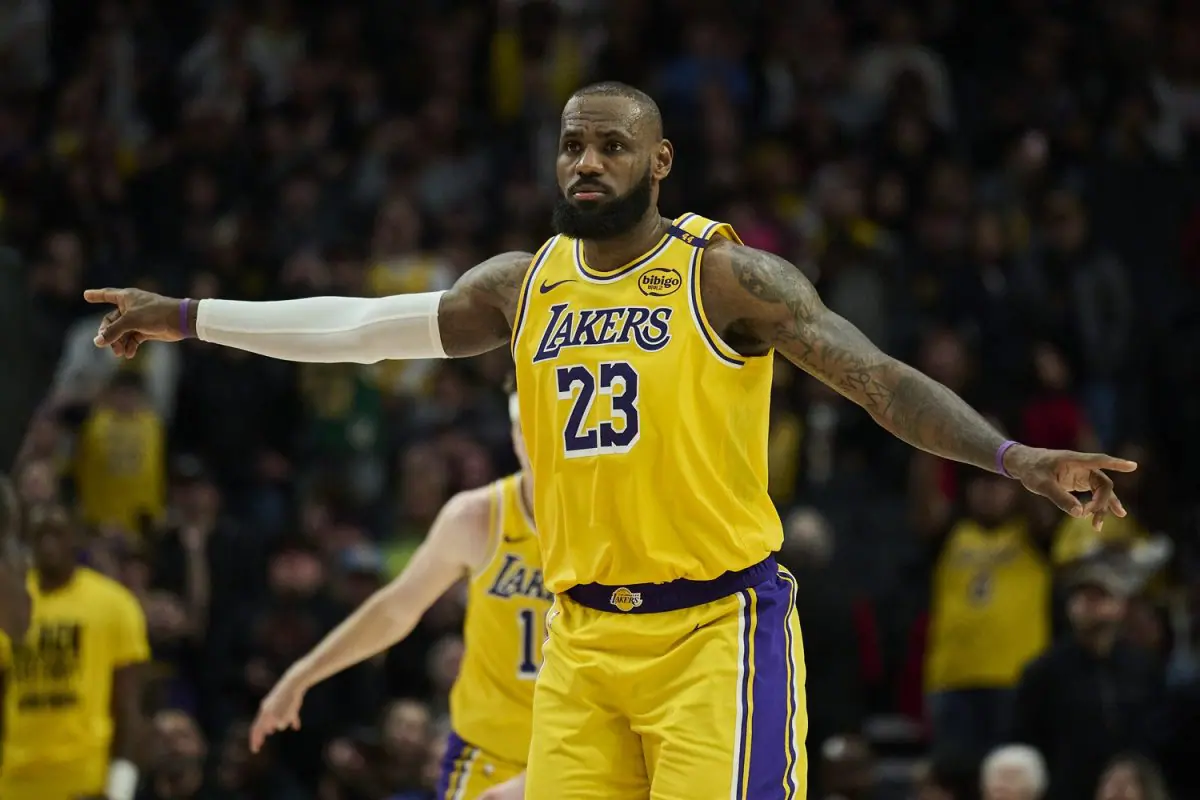For essentially a full calendar year, the Los Angeles Lakers have been trying to trade D’Angelo Russell. Two new contracts and several thousands of trade rumors since, there stands Russell, poised to once again handle the reins of the Lakers offense. Alongside him, Austin Reaves is ready to step into a larger role. Gabe Vincent might finally be healthy. Maybe. Hopefully.
What the Lakers have is a solid regular season guard rotation. What they need is a good rotation that won’t disappear in the postseason. How they get to that latter point is the subject of endless internal and external debate. Let’s go player by player to try to make sense of it all.
D’Angelo Russell
In aggregate, Russell was probably the Lakers’ third-best player behind LeBron James and Anthony Davis. He set a team record for threes made in a season and did so at an incredible 41.5 percent clip on more than seven attempts per game. His defense will always leave plenty to be desired but there is no getting around the fact that the Lakers would have been significantly worse without him, which has made trading him next to impossible.
Still, because of Russell’s two straight postseason disappearances, according to sources close to the situation, Rob Pelinka has been making countless calls around the league to find a new home for the 28-year-old point guard. There just isn’t much interest around the league in Russell. He’s too old to be considered a project, too good for the Lakers to see as a sell-low candidate, and too inconsistent (or, perhaps, too consistently disappointing) for any team to believe he’ll impact winning when the games matter most.
Los Angeles has a couple paths forward:
- Stick with Russell and hope that maybe just maybe this is the year he doesn’t go missing in the postseason.
- Trade Russell to the highest bidder and hope that Reaves, Vincent and Max Christie are ready to supplement any guard production they lose in the transaction.
Essentially, there is no risk-free option. Keep Russell, and risk having a starter sitting for chunks of a postseason series because his game doesn’t translate. Trade Russell, and risk not making the postseason at all.
Also complicating things is the role JJ Redick has in mind for Reaves. Sources close to the Lakers say Redick is ecstatic about what Reaves is capable of with the ball in his hands and wants a lot more of that compared to Reaves’ role in Darvin Ham’s offense. Issue there is: Russell wants the ball in his hands, James needs the ball in his hands and even Davis is supposedly going to be used as more of a hub this season. There just aren’t nearly enough touches to make all that work.
One option that surely wouldn’t go over well in Russell’s camp would be approaching him and explaining to him that he’d actually have more touches with the second unit than with the starters. In a bench role, Russell’s defense also wouldn’t hurt as much. If they were to go in this direction, Redick would face his first test right off the bat, asking a career-long starter to sacrifice for a team that, again, has been trying to trade him since last summer and will continue trying to trade him heading into this season.
Redick has since announced the starting lineup ahead of camp. Russell will join Reaves, Rui Hachimura, James and Davis on the court to start each game. So, there goes that dream.
No matter the role, the Lakers are going to have to figure out how to square how much they need Russell with how badly they need to upgrade either at his position or by using his contract.
Austin Reaves
Pelinka, Jeanie Buss and the rest of the upper tier of the Lakers organization have been absolutely adamant in their unwillingness to consider Reaves a part of any trade offer. According to league sources, after teams ask about the Lakers’ first-round picks, their next target has consistently been Reaves. It’s for good reason. He has been legitimately good, is currently on a great contract and, according to anyone you talk to close to the Lakers, seems poised for another leap forward.
Such a leap should’ve happened last year, but Reaves and Ham never quite saw eye to eye, according to sources. Over the course of the season, the two were never openly adversarial with each other, but neither party was particularly warm about the other, either. Ham wanted to pigeonhole Reaves into a gritty, defense-first, shooting role (think Donte DiVincenzo), but Reaves, well, isn’t Donte DiVincenzo.
Still, that stance has been polarizing among a fan base that has watched trade target after trade target remain on his respective team, or in Dejounte Murray’s case, gone to a completely different organization after negotiations between the Lakers and Atlanta Hawks fell through. Now, heading into his fourth season, the pressure is squarely on Reaves to prove he’s worth the lofty price Pelinka has place on him in trade negotiations.
The questions becomes…how? How does Reaves actually live up to those expectations with Russell taking up any possession James or Davis doesn’t dominate? Will he be relegated to an off-ball role? Will his focus shift to motion shooting? Will Reaves spend more time on the ball with Russell shifting to floor spacer?
Oh, and, well, what about the defense?
Russell is inconsistent at best defensively, which forces Reaves to guard the other team’s best perimeter player, especially with Jarred Vanderbilt expected to miss the opening stretch of the season. Such responsibilities defensively affected Reaves’ legs on the offensive end last year, making him a much lesser version of himself — one whose offensive impact is lessened by his fatigue and his defensive impact inherently compromised by his physical limitations.
Ideally, Russell would have been moved and replaced by a defensive-minded off-guard who can space the floor (ironically, Kentavious Caldwell-Pope perfectly fits this archetype). Alas, Russell will start the season alongside Reaves in the backcourt. Either Redick’s coaching will elevate the pairing to higher heights than his predecessor did, or the Lakers will make do until one (or both) are gone.
Max Christie
A fun Twitter search during Lakers games last year was “Christie.” Night in, night out, fans showed ample frustration having to watch Cam Reddish, Taurean Prince or seemingly anyone else but Christie get opportunity after opportunity. As a result, Pelinka had to make a decision on Christie this summer with an impossibly complicated sample size to work with.
Pelinka wound up re-signing Christie to a four-year contract worth $32 million. In speaking to people around the league, it’s the kind of deal neither party is all that thrilled about. The Lakers can’t feel great about the contract’s length given how little Christie has proven on the court. Christie’s camp can’t exactly love the low average income per year.
After years of being a tantalizing concept, though, it’s time for Christie to actually step up. If he isn’t ready to fill a key role in the rotation, the Lakers are left with hoping rookie Dalton Knecht is ready for consistent NBA minutes.
Dalton Knecht
Speaking of Knecht, the Lakers landing him with the No. 17 pick was widely considered a major organizational win. He’s one of the most NBA-ready prospects coming out of the draft and already has a legitimate NBA skill in his ability to knock down shots. To start, he’ll have a jumbled guard rotation to try to earn minutes from, but the Lakers, according to several sources, believe he can make an impact right away, should he be thrust into rotation minutes by injuries.
Gabe Vincent
Speaking of injuries, Vincent’s return to the rotation is one of the biggest differences heading into the season. Ideally, he’d operate as a steady hand in bench lineups, make the occasional start if the situation demands it, and perhaps even close games from time to time if one of the starters is struggling. If Pelinka is able to find a trade partner for Russell and doesn’t land a guard in the deal, Vincent becomes an absolutely crucial part of the rotation.
No matter what, the Lakers will need a lot more than they got from their biggest offseason acquisition a year ago.
Jalen Hood-Schifino and Bronny James
If we see very much from either guy this year, something will have gone either incredibly well, or disastrously.
All in All…
The Lakers have a bevy of pretty good guards who don’t make each other better. If they’re actually going to compete at the level fans expect, they’ll need to make an upgrade without taking away too much of the production that got them to the playoffs last year.


